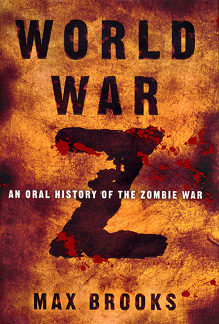Sure, there's some good zombie killing satisfaction to be had in WWZ, but what makes this novel most interesting is what it reveals about international diplomacy, military strategy, and world cultures.
The story takes place after the global zombie outbreak has been quelled and is told in the form of interviews of people around the world who experienced the crisis. We meet generals, soldiers, spies, orphaned children, and mercenaries. We hear from the Chinese doctor who discovered the first case in a rural village--a village created by citizens of an older village destroyed by the Three Gorges Dam. As news about the outbreak spreads around the world, most nations respond with skepticism--who would believe that an infection really could cause the dead to walk and eat other humans? The Israelis would. According to the Brooks' world, a nation with their history, always forced to be on guard, take unlikely threats seriously. They urge people, including Palestinians, to establish quarantine zones, which is met with an understandable lack of trust.
How does South Africa with its history of apartheid respond to a zombie invasion? How would a blind victim of the bombing of Hiroshima survive a year in the infested wilderness? How would Cuba's 50-year trade embargo help it become an economic superpower during a zombie crisis? The questions aren't practical, but the answers are revealing.
The novel also addresses some of the issues our current military faces. Wired Magazine recently published Noah Schatman's "The End of the Air War," which explains why America's dominant Air Force isn't useful in conflicts like Afghanistan. With the ubiquity of information and news, bombing a village is no longer a good way to make peace. The rules have changed.
In a zombie war the rules change even more drastically. What good is an expensive stealth bomber when fighting an enemy that can't tie a shoe, much less use radar. World War Z also exposes the importance of psychological warfare simply because zombies are immune to it. You can't discourage a zombie army into thinking the war is hopeless the way the allies did in World War I. They just want brains, and they're willing to seal-walk their exploded torso into a wall of bullets to get them. History books tell us World War II was a "Total War." World War Z shows us how history books lie. Expect a novel about zombies. Get a lesson in the economics and psychology of warfare.
I read somewhere that the job of a novelist is to send a character up a tree and then shake that tree to try to get him to fall out. As he hangs on, we gain insight into the character. Max Brooks sends our globalized society up a tree and shakes the hell out of it revealing insight similar to what one might find in Foreign Affairs or The Economist.








